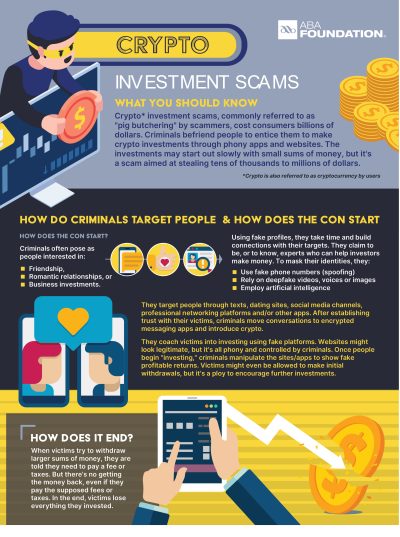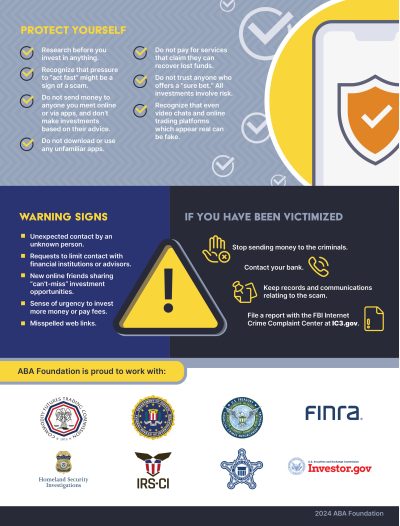
Red Flags and Tips to Protect Yourself from Scammers
Every day, thousands of people fall for fraudulent emails, texts, and calls from
scammers pretending to be from their bank. Use these tips to make sure
you’re not one of them.
Fidelity State Bank will never ask for the following via email, text or phone call:
PINs, account numbers, passwords, usernames, birthdays, social security numbers, security
question answers, one-time security code, etc. Protect this information if someone contacts you
purporting to be from a financial organization. NOTE: You may be asked to verify confidential
information if you call your bank, but never the other way around.
No legitimate business or government, including Fidelity State Bank, will email, text, message on
social media or call you demanding you buy or pay with gift cards or cryptocurrency, like Bitcoin.
Emails: Use extreme caution when clicking email links or opening attachments. Do not reply to
the sender or call a provided number if you suspect a scam. Contact the bank or financial
services provider directly!
Watch for misspelled words. As sophisticated as scammers have become, they may still make
mistakes, so watch for typos that can indicate an illegitimate source. When dealing with bank card issues, call the number on your credit or debit card for support rather than any numbers sent to you via email or text message. You can also find contact information by going directly to a company’s official website (ex: www.fidelitytopeka.com)
IMPORTANT REMINDER: Never share your login credentials for person-to-person payment
apps like Venmo, CashApp, or others. Fraudsters commonly entice individuals to provide login
credentials saying they need the information to process a refund, for example. Once they have
access, they can quickly transfer money to another account.
Please reach out to us if you notice suspicious activity, suspect a scam or have any questions.
Phone: (785) 295-2100 E-Mail: [email protected]
CRYPTO INVESTMENT SCAMS
CRYPTO INVESTMENT SCAMS
What You Should Know
Crypto* investment scams, commonly referred to as “pig butchering” by scammers, cost consumers billions of dollars. Criminals befriend people to entice them to make crypto investments through phony apps and websites. The investments may start out slowly with small sums of money, but it’s a scam aimed at stealing tens of thousands to millions of dollars.
*Crypto is also referred to as cryptocurrency by users
How Does the Con Start?
Criminals often pose as people interested in:
Friendship,
Romantic relationships, or
Business investments.
Using fake profiles, they take time and build connections with their targets. They claim to be, or to know, experts who can help investors make money.
To mask their identities, they:
Use fake phone numbers (spoofing)
Rely on deepfake videos, voices or images
Employ artificial intelligence
They target people through texts, dating sites, social media channels, professional networking platforms and/or other apps. After establishing trust with their victims, criminals move conversations to encrypted messaging apps and introduce crypto.
They coach victims into investing using fake platforms. Websites might look legitimate, but it’s all phony and controlled by criminals. Once people begin “investing,” criminals manipulate the sites/apps to show fake profitable returns. Victims might even be allowed to make initial withdrawals, but it’s a ploy to encourage further investments.
How Does it End?
When victims try to withdraw larger sums of money, they are told they need to pay a fee or taxes. But there’s no getting the money back, even if they pay the supposed fees or taxes. In the end, victims lose everything they invested.
Protect Yourself
Research before you invest in anything.
Recognize that pressure to “act fast” might be a sign of a scam.
Do not send money to anyone you meet online or via apps, and don’t make investments based on their advice.
Do not download or use any unfamiliar apps.
Do not pay for services that claim they can recover lost funds.
Do not trust anyone who offers a “sure bet.” All investments involve risk.
Recognize that even video chats and online trading platforms which appear real can be fake.
Warning Signs
Unexpected contact by an unknown person.
Requests to limit contact with financial institutions or advisors.
New online friends sharing “can’t-miss” investment opportunities.
Sense of urgency to invest more money or pay fees.
Misspelled web links.
If You Have Been Victimized
- Stop sending money to the criminals.
- Contact your bank.
- File a report with the FBI Internet Crime Complaint Center at IC3.gov
Source: 2024 – American Bankers Association



